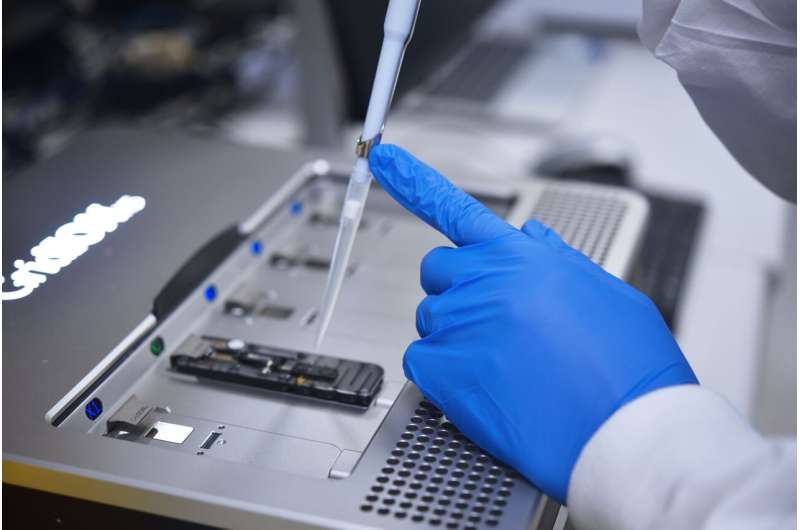This article has been reviewed according to Science X's editorial process and policies. Editors have highlighted the following attributes while ensuring the content's credibility:
fact-checked
peer-reviewed publication
proofread
New nanopore tech for quicker, more thorough mRNA quality checks

Researchers at The University of Queensland are harnessing the latest sequencing technology developed by UK-based biotech Oxford Nanopore Technologies to analyze mRNA vaccines and therapies.
This approach promises to simplify and better ensure the quality of manufactured mRNA-based vaccines and therapeutics worldwide.
The BASE team at UQ's Australian Institute for Bioengineering and Nanotechnology (AIBN) is already recognized as the biggest supplier of research-use mRNA in Australia, having built more than 200 mRNA vaccines and therapies for academic, clinical and industry use.
Building upon this work, under the new research partnership with Oxford Nanopore, BASE researchers will use the latest and improved nanopore-based sequencing technology to optimize performance and reduce the time needed to measure mRNA vaccine quality attributes.
"Currently, mRNA vaccines and therapies are analyzed using a range of different methods that are time-consuming, complicated, and costly, and often outdated," said BASE mRNA technologies researcher Dr. Helen Gunter.
BASE researchers showed how nanopore sequencing can analyze the quality of mRNA vaccines and therapies, in a study published today (Sept. 21) in Nature Communications.
"By using Oxford Nanopore Technologies sequencing, we can directly analyze each individual mRNA vaccine molecule as it passes through a protein nanopore, providing a real-time measurement of the mRNA sequence identity and integrity," Dr. Gunter said.
This approach could also provide a useful research tool to better understand how mRNA vaccines work by studying how they behave within cells.
Crucially, Dr. Gunter said in the future, mRNA vaccines could be analyzed in real-time, providing testing within hours of mRNA manufacture so quality control issues could be quickly detected. Such rapid analysis is critical during the rapid manufacture of mRNA vaccines needed during a pandemic—or to support the future development of personalized therapies.
The recent success of COVID-19 mRNA vaccines had focused considerable attention and investment on the development of mRNA vaccines and therapies, with estimates valuing the mRNA market at $US68 billion by 2030.
However, to realize this potential, Dr. Gunter said mRNA products must be manufactured at the high quality needed to ensure their effectiveness.
"Ultimately, we anticipate the use of nanopore RNA sequencing methods will become central to the development and manufacture of mRNA drugs," Dr. Gunter said.
"We are excited to partner with the BASE team at The University of Queensland to further research supporting the manufacture and quality control of mRNA vaccines and therapies," said Gordon Sanghera, CEO of Oxford Nanopore.
"Nanopore sequencing is the only sensing technology that can read native RNA in real time, making it an essential part of the toolkit supporting the development of mRNA-based therapeutics."
More information: Helen M. Gunter et al, mRNA vaccine quality analysis using RNA sequencing, Nature Communications (2023). DOI: 10.1038/s41467-023-41354-y
Journal information: Nature Communications
Provided by Australian Institute for Bioengineering and Nanotechnology (AIBN)





















